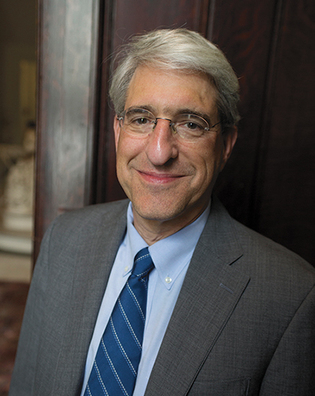 loading
loading
Q&A: Peter SaloveyPitching inHow Yale’s president spent the Day of Service. The Yale Alumni Magazine regularly holds a conversation with Yale president Peter Salovey ’86PhD to provide a forum in which alumni can learn his views. (Interviews are conducted both in person and by e-mail and condensed for print.)  Mark OstowIn this issue, Salovey talks about the Yale Day of Service. View full imageYale Alumni Magazine: May 12 was the Yale Day of Service—in fact, the tenth anniversary of the Yale Day of Service. I hear you signed up. Peter Salovey: Yes, this was another May in which alumni, faculty, staff, and students devoted a day to serving their communities. I spent my Day of Service at New Haven Reads—a nonprofit organization that distributes free books and provides tutoring to children. It was founded by the late Chris Alexander, who was a wonderful member of the Yale and New Haven communities. The intersection where its first office opened is now Chris Alexander Corner. I was at New Haven Reads with about eight other volunteers. One child I worked with was a third-grade girl whose regular tutor was not available that day. She had been coming to New Haven Reads every week, almost without fail, for two years. Her reading skills had improved dramatically. We worked on vocabulary, phonics, and a sentence completion drill, and I asked her to read to me from a book that she had been reading for several weeks. When her dad came to pick her up, he told me that he has been pleased with her progress. Y: And he must have been pleased to find the president of Yale tutoring her. S: He did notice that, but I think his daughter just thought some guy named Peter was tutoring her. She was right, of course. Y: What did you take away from the experience? S: It was very inspiring and gratifying to join others in helping members of our community. As an undergraduate in psychology, and then as a graduate student, I was always interested in the connection between human emotion and prosocial behavior. Do we help others because we are feeling good? Or does helping others make us feel good? It turns out both are true. I arrived at New Haven Reads early on a Saturday morning. It was rainy. University business kept me up late Friday night, so I was a little tired. And an hour later, after tutoring my first student, I was energized. It was like running a couple of miles on a treadmill—tutoring seemed to release my endorphins. Making a human connection has a psychological effect that probably leads to biological changes as well. That kind of connection encourages us to help even more people. Y: How would you describe the objectives of the Day of Service? S: The idea behind this program, founded and run by the Association of Yale Alumni, is twofold. It creates opportunities for us to give back, as an expression of our appreciation for having been at Yale. But also, we give back as part of a community—we are building bonds with people inside and outside of our campus. An undergraduate, a graduate student in biology, and alumni from different generations of Yale were with me at New Haven Reads, and we all felt the shared joy of serving together. John Kerry ’66 and Marian Wright Edelman ’63LLB were our Day of Service honorary cochairs. These are people who have devoted their lives to serving society. Their participation helped bring us together as a Yale community. Y: How much of an effect can one day have? S: Giving back should not be just the activity of a single day, but the Day of Service exposes people to new opportunities to connect with their communities. It demonstrates to individuals who feel they do not have time for service that maybe they do occasionally. So, a single day of service may lead to more engagement. This year, more than 3,500 members of the Yale community, in 47 states and 20 countries, participated. If every participant tells someone else, even more people across our country and around the world will be involved next year. Service is in Yale’s DNA. In Yale’s commencement ceremony, the president admits students to all the “rights and responsibilities” that their degrees afford. As we have discussed before, Yale University graduates go on to teach, start businesses, make groundbreaking scientific discoveries, serve in the military, hold public office, and lead in many other ways. In addition, a large number of our faculty and staff do service: they coach local sports teams, champion environmental causes, or are involved in their community foundations or a church, synagogue, or nonprofit organization. Of those to whom much is given, much is expected. We should always be looking for ways to give back.
|
|
1 comment
-

Muhammad Azeem, 12:28am August 29 2018 |  Flag as inappropriate
Flag as inappropriate
The comment period has expired.Thanks For sharing this . THis Is so amazing .
THanks
Bepanah